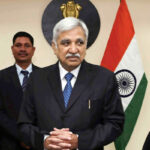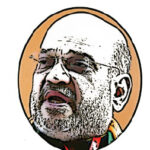- Cover Story
- Governance
- Globe Scan
- Corruption
- State Scan
- Talk Time
- Cover Story
- Governance
- Globe Scan
- Corruption
- State Scan
- Talk Time
Recent Posts
© Copyright 2007 - 2023 Gfiles India. All rights reserved powered by Creative Web INC.Cover StoryJaishankar in cabinet; next, F-16 in IAF
Starting with Brajesh Mishra as Vajpayee’s NSA and ending with the Modi-Jaishankar duo, India’s slide into the US camp has been a guided affair. What’s new is that Modi felt his NSA, AjitDoval, couldn’t hack it and cut him off from policies and decisions pertaining to foreign and military affairs, his role all but zeroed out with Jaishankar formally outranking him
Bharat KarnadJune 5, 20197 Mins read95 Views
 Written by Bharat Karnad
Written by Bharat KarnadWhether or not Narendra Modi delivers on any other election promises, one goal he will realize, with S Jaiskankar, the former Foreign Secretary and virtually Washington’s Man in Delhi in the Union cabinet, is to, in fact, make India a full-fledged American “ally”—a label used by US President Donald Trump just yesterday. “Ally” is a loaded word but if India warrants this designation it is in no small part because of Jaishankar’s successful endeavours over the years, in connivance with soft-headed political leaders, to rob this country of its policy latitude and freedom of action, reduce it, in the process, to America’s subsidiary ally as apprehended in my last two books—‘Why India is Not a great Power (Yet)’ [2015], and ‘Staggering Forward: Narendra Modi and India’s Global Ambition’ [2018].
Subrahmanyam Jaishankar comes straight into the cabinet from his job with the Tata Group where he looked after its foreign interests, mostly trying to force the US defence major Lockheed Martin’s F-16/F-21 India project down the Indian Air Force’s throat. That Modi thinks highly of him, there’s no doubt. That he was instrumental in nudging Modi into getting the Indian foreign policy to tilt far more towards the United States than the PM was originally inclined to do, is also not a secret in Delhi corridors, nor that he has been assisted by a whole bunch of Indian-origin Washington thinktankers, like Ashley Tellis at Carnegie, who frequently visit Delhi and meet with the PM.
Indeed, Modi was so keen that Jaishankar keep pushing the American line from the outside that he generously waived the “cooling off” period required of civil servants and senior military officials on their superannuation before taking up private sector jobs. There is delicious irony here. It was Jaishankar as Foreign Secretary, who in 2015 or thereabouts warned the retired former naval chief, Admiral Nirmal Verma, against taking up the job of lecturer at the US Naval Academy, Newport, Rhode Island, immediately after ending his stint as High Commissioner to Canada. The “cooling off” period is there to ensure national secrets are not compromised. Verma paid no heed and now performs duties that small-time outside lecturers pull at the Academy!

F-16 combat aircraft When Jaishankar moved directly from MEA to Tatas (as he did from Tatas into the cabinet), he used his past connections to push the case with the PM for Tata-built F-16s for the Indian Air Force. Lockheed Martin chose Tatas to license-manufacture the frightfully old, Museum-ready, F-16 combat aircraft, designed in the late 1960s, for IAF service in the 3rd decade of the 21st Century. And Ratan Tata, in turn, selected Jaishankar to get the F-16 contract through the Modi government. Now that he is the external affairs minister, one can expect that among his first orders of business will be to fast-forward the F-16/F-21 license production agreement for the Tatas to implement.

The President, Shri Ram Nath Kovind administering the oath as Cabinet Minister to Dr. Subrahmanyam Jaishankar, at a Swearing-in Ceremony, at Rashtrapati Bhavan, in New Delhi Jaishankar is being suitably pumped up for the task, hailed by the Indian media as the foreign policy brain-trust for the PM and a strategic avatar of his venerable father, K Subrahmanyam. News 18 called him “one of the mightiest brains on strategic affairs in the country” which, if true, will be entirely in the service of a foreign country. More such puff pieces can be expected in the media in the days to come, In any case, his being credited with the “mightiest [strategic] brains” is problematic considering, that like his father, he has not published a single book—very different from compiling op-ed articles into books as Subrahmanyam did, which is easy. But unlike his father, who had a deep intellect, was well read and had schooled himself in the arcana of nuclear deterrence while in service, the son in this regard is, well, not so much.
Jaishankar’s progress has interested me from the time I first came in contact with him in Washington, where he was political counselor in the Indian embassy in the early- to mid- 1980s. Like all JNU leftist types, he was, I could see, smitten by America. Washington, in turn, marked him out as a person who would be useful and whose career needed to be suitably nursed and pushed with well-placed tactical successes to help grow his reputation in Delhi as someone who could get things done vis a vis the American government. It helped him climb the ladder in the Foreign office. This and the fact that his father–the old IAS hand with considerable influence in government—planned his career and managed his rise by importuning foreign ministers of the day to place him in select MEA and foreign posts.
Modi was so keen that Jaishankar keep pushing the American line from the outside that he generously waived the “cooling off” period required of civil servants and senior military officials on their superannuation before taking up private sector jobs

Prime Minister Narendra Modi with Dr. Subrahmanyam Jaishankar Meanwhile, the American hand propelling Jaishankar’s career trajectory upwards didn’t hurt. A minor peak was reached when he was appointed Joint Secretary (Americas) during Manmohan Singh’s time. In this capacity he negotiated the one-sided and ruinous civilian nuclear cooperation treaty with the US, courtesy which India, in effect, signed away its freedom to resume nuclear testing and become a thermonuclear military power of note. This was the sort of payoff Washington was looking for when it first identified him as a comer who would be useful in advancing US interests in Delhi—the “long view” strategic thing the US government, aided by its Delhi embassy, has always done. His record was buttressed during his time as ambassador to the US, in which post he won Modi’s heart by mobilising the BJP-leaning NRI crowd culminating in the intoxicating event for Modi—the massive Madison Garden do. The bigger payoff to the US came when he was ensconced as Foreign Secretary by Modi. Jaishankar doubled down on benefiting the US by pushing the PM to accept the “foundational accords”—LEMOA, CISMOA and the soon-to come BECA that a strategically limited visioned Modi was not averse to. Incidentally, MEA worked on these agreements with the initial negotiating drafts provided by Washington for each of these treaties. May be this was to ease MEA-GOI’s and Jaishankar’s work-load! In reality, these accords will result in the outsourcing of India’s strategic security without in any way shoring up India’s defences. It is a defeatist policy based on the mistaken belief that India cannot tackle China by itself, which is simply not the case.
Starting with Brajesh Mishra as Vajpayee’s NSA and ending with the Modi-Jaishankar duo, India’s slide into the US camp has been a guided affair. What’s new is that Modi felt his NSA, AjitDoval, couldn’t hack it and cut him off from policies and decisions pertaining to foreign and military affairs, his role all but zeroed out with Jaishankar formally outranking him. This the PM arranged, perhaps, also with a view to taking down Doval a peg or two. It may be noted that Modi denied one of Doval’s sons a BJP ticket to contest the general elections from a hill state.
Jaishankar’s attraction to Modi owes much to the latter’s conviction that an “aspirational and assertive” India requires to canoodle with America to find its place in the world, when exactly the opposite is true and would fetch the country far greater leverage and improve its international standing as a strategically autonomous entity that’s not to be trifled with. Modi expects Jaishankar to leverage the country’s strengths except, given his track record, he will very likely lever India right into Washington’s lap.

Brajesh Mishra And K Subrahmanyam The PM is apparently also impressed by Jaishankar’s formulation of a China policy based on the principle that “differences” need not become “disputes”. This is fine but ignores the basic fact of China being a geopolitical, ideological, economic and military rival of India in Asia, and unless differences are indeed treated as disputes, China will walk away with the prize. I mean, all the renewed bhai-bhai stuff has got India what? Absolutely zilch, nothing, except demands to strengthen the status quo exclusively benefiting China!
Jaishankar’s attraction to Modi owes much to the latter’s conviction that an “aspirational and assertive” India requires to canoodle with America to find its place in the world, when exactly the opposite is true and would fetch the country far greater leverage and improve its international standing as a strategically autonomous entity that’s not to be trifled with
With Jaishankar in place, the US-supportive policy “eco-system” in Delhi detailed in my latest book ‘Staggering Forward’ and led by the Delhi chapters of Carnegie and Brookings, will become even more active. This is a circle Jaishankar is connected with via immediate family links. His every move will be cheered by Indian media columnists and commentators from Delhi to Singapore, and this eco-system, generally, will continue oxygenating the thinking by retired and serving diplomats, senior civil servants and military officers, and provide them platforms to voice opinions about making Indo-US relations the central pillar of this country’s foreign policy. This entire caboodle constitute the Trojan Horse that is already at the centre of government, and helping root in the socio-political milieu a mindless hankering for all things American and this at a time when US’unreliability as partner is manifest.
In this context what happens to protecting and furthering India’s vital national interests, which are at huge variance to US interests in the Indo-Pacific and in the nuclear security, advanced technology and other realms? This is apparently nobody’s concern. National interests are, in fact, now orphaned as Modi-Jaishankar get into their stride. And contrary, realist and uncompromising and uncomprisable nationalist views, however substantively argued, will get short shrift.
But, hey, India and IAF will have the F-16/21 good enough, alas, only to play at war not actually to fight wars with!
(Bharat Karnad is India’s Foremost Conservative Strategist. He is Professor for National Security Studies, Centre for Policy Research, New Delhi. His most recent book, Staggering Forward: Narendra Modi and India’s Global Ambition was published by Penguin in September 2018. Previous books include Why India is Not a Great Power (Yet) (Oxford University Press, October 2015), Strategic Sellout: India-US Nuclear Deal (2009), Índia’s Nuclear Policy (Praeger, 2008), Nuclear Weapons and Indian Security: The Realist Foundations of Strategy)
Recent Posts
Related Articles
Cover StoryTablighi Jamaat : 1000 years of revenge
Written by Vivek Mukherji and Sadia Rehman Two contradictions are evident. Through April...
ByVivek Mukherji and Sadia RehmanMay 5, 2020Cover StoryWINDS OF CHANGE
Written by Gopinath Menon ADVERTISING : The name itself conjures up exciting images....
ByGopinath MenonMarch 4, 2020Cover StoryTHE ECONOMIC ROULETTE WHEEL
Written by Alam Srinivas THE wheel spins, swings, and sweeps in a frenzied...
ByAlam SrinivasMarch 4, 2020Cover StorySYSTEMS FAILURE, SITUATION CRITICAL
Written by Vivek Mukherji ONE of most quoted allegories of incompetence for a...
ByVivek MukherjiMarch 4, 2020 - Governance
- Governance





























































